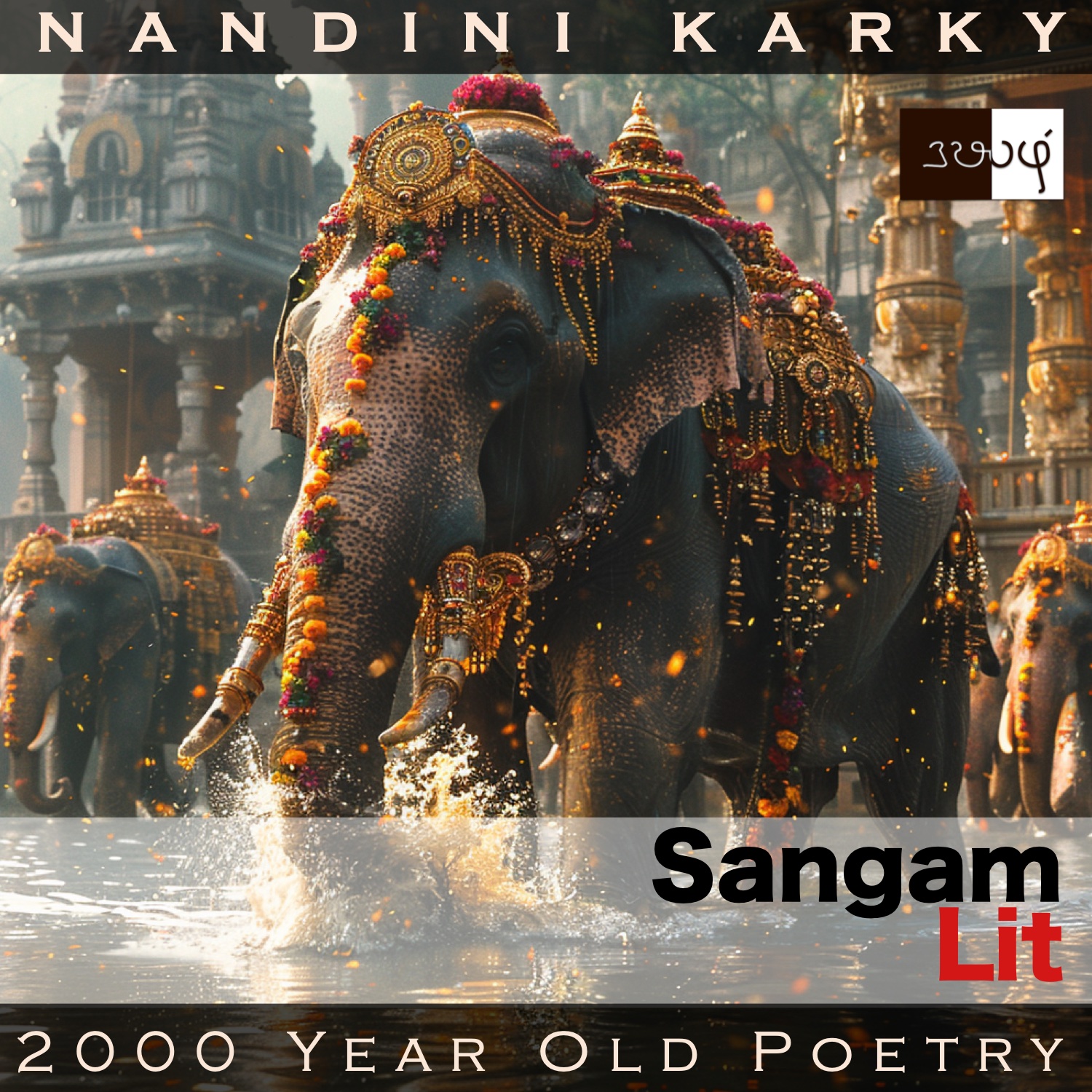Podcast: Play in new window | Download
Subscribe: Apple Podcasts | Spotify | Amazon Music | Android | iHeartRadio | Email | TuneIn | RSS | More
In this episode, we perceive events that have led to an outbreak of war, as depicted in Sangam Literary work, Puranaanooru 341, penned by the poet Paranar. Set in the category of ‘Kaanji Thinai’ or ‘Defence’, the verse etches the words and vows expressed before a battle.

வேந்து குறையுறவும் கொடாஅன், ஏந்து கோட்டு
அம் பூந் தொடலை அணித் தழை அல்குல்,
செம் பொறிச் சிலம்பின் இளையோள் தந்தை,
எழு விட்டு அமைத்த திண் நிலைக் கதவின்
அரை மண் இஞ்சி நாட் கொடி நுடங்கும்
………………………………………………………….
புலிக் கணத்து அன்ன கடுங் கண் சுற்றமொடு,
மாற்றம் மாறான், மறலிய சினத்தன்,
‘பூக் கோள்’ என ஏஎய், கயம் புக்கனனே;
விளங்குஇழைப் பொலிந்த வேளா மெல் இயல்,
சுணங்கு அணி வன முலை, அவளொடு நாளை
மணம் புகு வைகல் ஆகுதல் ஒன்றோ
ஆர் அமர் உழக்கிய மறம் கிளர் முன்பின்,
நீள் இலை எஃகம் மறுத்த உடம்பொடு
வாரா உலகம் புகுதல் ஒன்று எனப்
படை தொட்டனனே, குருசில்; ஆயிடைக்
களிறு பொரக் கலங்கிய தண் கயம் போல,
பெருங் கவின் இழப்பது கொல்லோ,
மென் புனல் வைப்பின் இத் தண் பணை ஊரே!
Further details are rendered to us about the scenario involving the refusal of a maiden’s hand in marriage. The poet’s words can be translated as follows:
“Even though the king pleads with him, he renders not; He is the father of that young maiden with uplifted loins covered with beautiful flower garlands and adorned with etched strands; A girl who wears red-spotted anklets. Above her father’s sturdy doors bolted with strong locks and walls cemented with clay, flutters his victorious flag… Akin to a tribe of tigers, stand harsh-eyed his relatives. He is not one who will change his mind- that man of hostility and anger. He now commands, ‘Wear your flowers’ and enters the pond;
As for the king who came to him, he declares, ‘Tomorrow is the day when either I marry and embrace the pallor-spotted bosom of the gentle maiden adorned with radiant jewels or after fighting with immense strength in the great battlefield, leaving behind this body that accompanies not, filled with scars born of resisting long blades of spears, I enter the higher world’ and he readies his weapons. So, akin to a clear pond that is muddied because of enemy elephants, this cool and fertile town with delicate fields is about to lose its great beauty!”
Time to explore the intricacies. The poet goes straight to the core issue and declares no matter how the king begs with reverence, this leader would not accept to give his daughter in marriage. A girl described as young and beautiful, wearing delicate anklets. Next, the poet turns to the image of refusal that is reflected in the bolted fort doors of this girl’s father, fluttering with his flag of victory. Next, to describe the kind of crowd this leader moves with, the poet brings before our eyes a group of harsh-eyed tigers. Incidentally, I learnt today that the collective noun for this group of tigers is ‘ambush’. Something that sounds threatening indeed! Returning, the poet declares with resignation nothing will make the girl’s father change his mind. Why now he seems to be asking his soldiers and supporters to wear their flower insignia and prepare for battle as he himself enters the pond to cleanse himself before the event, the poet adds!
From this king’s fort, our poet takes a walk to the enemy camp and overhears the king who was refused swearing an oath. He vows that either he will marry the girl he sought or he will fight till the end and leave behind his battle-scarred body in this mortal world and move on to the higher place. A clear declaration of ‘Do or Die’, it looks like! Now, the poet concludes that given these developments, it seems certain that the beautiful farmland town with many riches is about be ruined like a pond into which an enemy elephant has been let loose!
A verse which graphically illustrates the ripple effect of a refusal. What would be interesting to know is the reason for such refusals. We have seen in the few songs so far that the father is intent on refusing the proposals he receives and defending his kingdom from attack. But we do not exactly know why he says no, and I hope other songs will reveal that. Leaving that unanswered question aside, if we reflect on who the hero of this verse is, I would say that credit should go to the poet. For here is a person, who is not glorifying war and violence, but lamenting that a place of beauty is about to be ruined because of the clashing egos of men. Sadly, a tragedy that befalls many a place in this world for the same reason even to this day!




Share your thoughts...